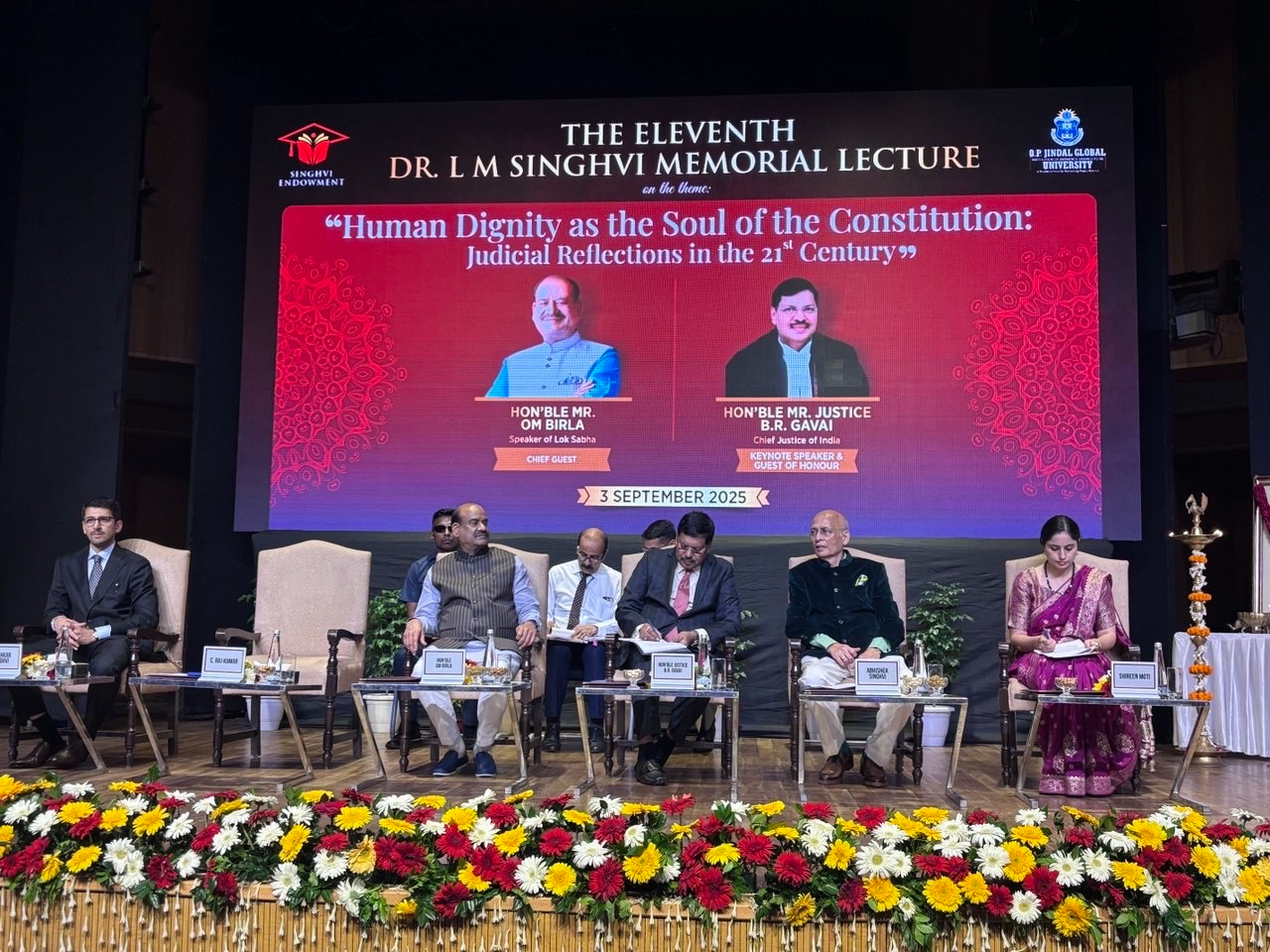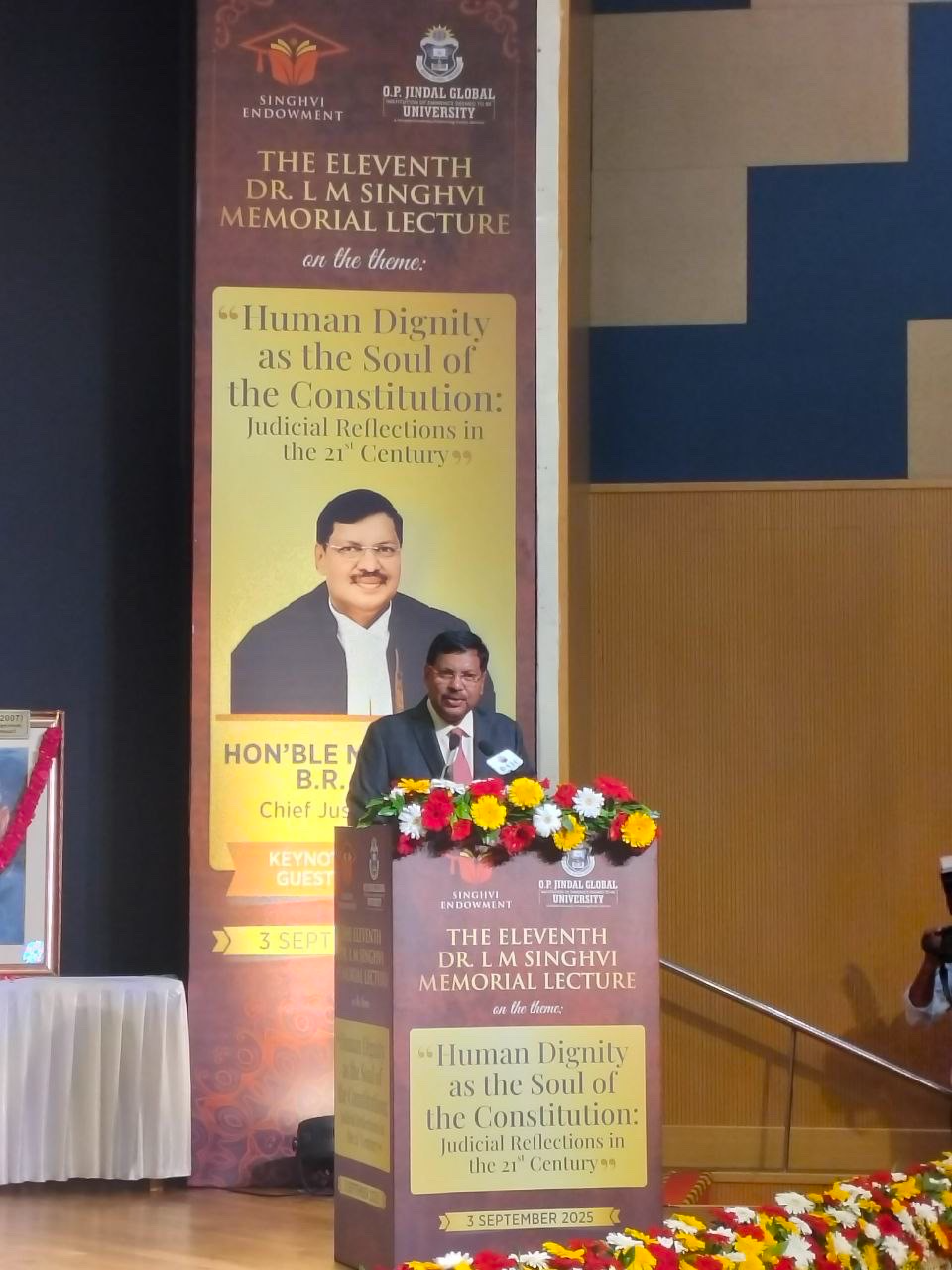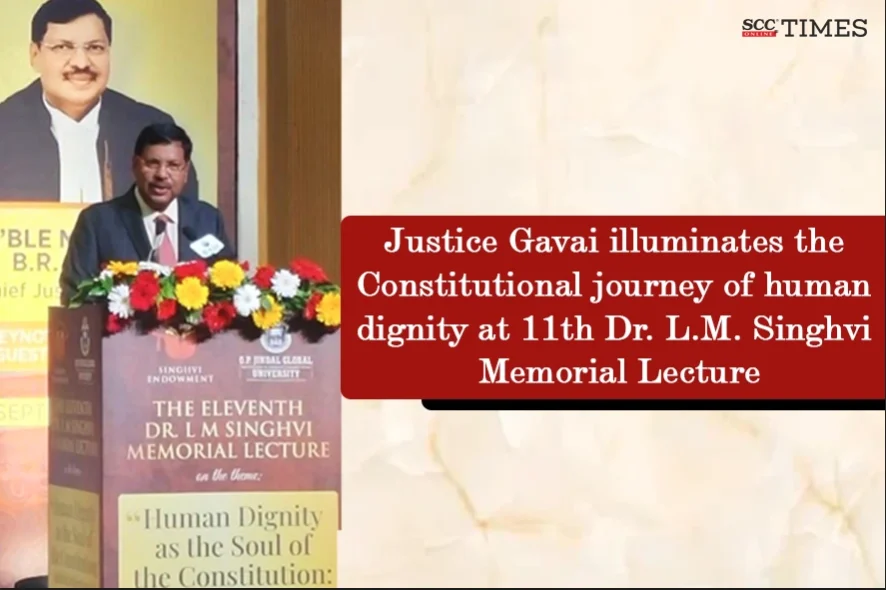The 11th Dr. L.M. Singhvi Memorial Lecture, held under the aegis of O.P. Jindal Global University, witnessed an erudite and thought-provoking keynote address delivered by Justice B.R. Gavai, the Chief Justice of India. The theme of the lecture, “Human Dignity as the Soul of the Constitution: Judicial Reflections in the 21st Century”, offered a timely exploration of the evolving jurisprudence around the concept of dignity in constitutional discourse.
Distinguished personalities present included Shri Om Birla, Speaker of the Lok Sabha; Dr. Abhishek Manu Singhvi, Member of Parliament and Senior Advocate; and Professor (Dr.) C. Raj Kumar, Vice Chancellor, O.P. Jindal Global University, among others.
The Dr. L.M. Singhvi Memorial Lecture Series was instituted to honour the life and legacy of one of India’s most distinguished jurists, diplomats, and public intellectuals. Each edition brings together eminent legal minds, public thinkers, and students to reflect on issues central to constitutional democracy, law, and justice.

Tribute to Dr. L.M. Singhvi

Justice Gavai commenced his address by expressing gratitude to the organizers and reflecting on his personal connection to Dr. L.M. Singhvi through his father, the late Shri R.S. Gavai, with whom Dr. Singhvi shared a meaningful professional association during their tenure in the Rajya Sabha.
The Chief Justice lauded Dr. Singhvi as a “scholar-statesman”, emphasising his multifaceted contributions as a jurist, diplomat, author, and parliamentarian. He recalled Dr. Singhvi’s diplomatic legacy as India’s High Commissioner to the United Kingdom, his role in conceiving the Pravasi Bharatiya Divas, and his pivotal contributions to Panchayati Raj Institutions. Justice Gavai also highlighted Dr. Singhvi’s leadership within the legal fraternity, noting his presidency of the Supreme Court Bar Association and his foundational role in establishing the Supreme Court Bar Association Trust.
A particularly symbolic contribution mentioned was the presentation of the statue of Mahatma Gandhi to the Supreme Court during Dr. Singhvi’s diplomatic tenure, a statue that now stands as a moral and architectural emblem at the court’s entrance.
Acknowledgement of Dr. Abhishek Singhvi’s Initiatives
Justice Gavai commended Dr. Abhishek Singhvi for upholding his father’s legacy through impactful educational initiatives, particularly the Singhvi Trinity Scholarship, which supports Indian students pursuing postgraduate legal education at the University of Cambridge. He described such efforts as investments in India’s intellectual and constitutional future.
Exploring the Theme: Human Dignity as the Soul of the Constitution: Judicial Reflections in the 21st Century
Justice Gavai’s central address focused on unpacking the idea of human dignity as an enduring constitutional value. Framing dignity as the “soul of the Constitution”, he noted that while the term does not appear explicitly in Part III of the Constitution (which enumerates Fundamental Rights), it has been consistently interpreted by the judiciary as a foundational and implied constitutional value.
Key Highlights:
-
Definition & Contemporary Relevance:
Justice Gavai defined human dignity as the intrinsic worth of every human being, simply by virtue of being human. In the 21st century, he argued, this principle has gained renewed relevance amidst technological advancements, changing social norms, and new dimensions of liberty and equality.
-
Judicial Engagement:
The address explored how Indian courts have embedded dignity into their interpretation of rights such as privacy, autonomy, and equality, thus making it a cornerstone of modern constitutional jurisprudence.
-
Foundational Legacy:
Citing Dr. B.R. Ambedkar, Justice Gavai highlighted that the Constitution was designed to remedy indignities—social, political, and economic, particularly those suffered by historically marginalized communities. He quoted Dr. Ambedkar’s remark on untouchability as a system that denied the “dignity and sanctity of human life.”
-
The Preamble and Fraternity:
Justice Gavai drew attention to the Preamble, which explicitly mentions “assuring the dignity of the individual and the unity and integrity of the Nation.” He explained that the constitutional linkage of dignity with fraternity, equality, and justice underscores its central role in building a democratic and cohesive society.
-
Democracy and Dignity:
Referring again to Dr. Ambedkar, Justice Gavai emphasised that fraternity is not just a social ideal but a prerequisite for democracy, requiring “respect and reverence toward fellowmen.” In this light, human dignity becomes essential not only to individual well-being but also to the very functioning of democracy.
Justice B.R. Gavai has observed that reflections of human dignity permeate multiple dimensions of the Fundamental Rights guaranteed under the Indian Constitution. He emphasised that the prohibition of arbitrariness under Article 14 ensures that state actions are guided by principles of reason, fairness, and equality, thereby safeguarding an individual’s sense of self-worth. This constitutional guarantee acts as a shield against arbitrary exercise of power and affirms the equal moral status of all citizens.
“Human dignity refers to the intrinsic worth and respect owed to every human being simply by virtue of being human”
Further, Justice Gavai underscored that the rights against discrimination under Articles 14 and 15, along with the guarantee of equality of opportunity under Article 16, are essential in affirming the inherent dignity of every person. These provisions prohibit unequal treatment on the basis of caste, religion, gender, or other personal characteristics, ensuring that dignity is not undermined by social prejudices or institutional biases.
He also noted that dignity underlies the freedoms enshrined in Article 19, which protect individuals’ autonomy in expressing their opinions, forming associations, and moving freely. These freedoms empower individuals to participate meaningfully in social, political, and economic life, thereby enabling them to lead fulfilling and dignified lives.
“When the dignity of every citizen is recognized and protected, it promotes a sense of belonging, mutual respect, and solidarity, which are essential for maintaining national unity and harmony.”
Most significantly, Justice Gavai highlighted the expansive interpretation of Article 21, which guarantees the right to life and personal liberty.
To substantiate this, Justice Gavai referred to a series of landmark Supreme Court judgments that have developed and reinforced the jurisprudence of dignity. Across these decisions, the judiciary has consistently affirmed that the protection of personal autonomy is a core mechanism through which the Constitution safeguards human dignity. He explained that autonomy, the ability to make choices about one’s own body, actions, and life circumstances, is essential to dignity. The courts have recognized this deep interconnection, particularly in cases concerning reproductive rights, privacy, and the right to refuse medical treatment, all of which derive strength from Article 21.
Justice Gavai then turned to the Court’s recognition of human dignity not only as an individual right but also as a collective value, particularly in relation to marginalized and socially disadvantaged communities. He noted that the judiciary has been conscious of how structural inequalities, historical injustices, and systemic discrimination can erode the dignity of entire social groups. To address this, the Court has consistently called for affirmative measures, equality-oriented safeguards, and systemic interventions. Dignity, in this broader sense, includes social recognition, mutual respect, and the opportunity for equal participation in society, going beyond formal legal protections to dismantle entrenched hierarchies and exclusion.
One significant area of growth in this jurisprudence has been the recognition of the dignity of persons with disabilities. Justice Gavai noted that the courts have increasingly emphasised the need for society and the State to remove physical, social, and institutional barriers that prevent individuals with disabilities from participating fully and equally in public life. Judicial pronouncements have stressed that persons with disabilities are entitled to autonomy, equality, and self-respect, and that reasonable accommodation must be ensured as a constitutional mandate.
“Reflections of human dignity are evident across multiple dimensions of the Fundamental Rights” Concluding his lecture, Justice Gavai observed that human dignity has been emphasised by the judiciary as the very soul of the Constitution. It is a pervasive constitutional principle that underlies and animates the core values articulated in the Preamble—liberty, equality, fraternity, and justice. The Supreme Court, across an evolving jurisprudence in the 20th and 21st centuries, has recognised dignity both as a substantive right and a normative lens through which all Fundamental Rights must be interpreted. It has been employed to safeguard a dignified existence for individuals and as a constitutional tool to expand, harmonize, and evolve rights, ensuring that they are meaningful, contextual, and responsive.
He concluded by affirming that anchoring constitutional interpretation in dignity ensures that the Constitution remains a living instrument, capable of responding to emerging social challenges while remaining faithful to its foundational values. Justice Gavai closed his address by quoting the landmark judgment in KS Puttaswamy v. Union of India, 10 SCC 1 (2017) encapsulating the spirit of his lecture:
“To live is to live with dignity… Dignity is the core which unites the fundamental rights because the fundamental rights seek to achieve for each individual the dignity of existence.”
Justice Gavai’s lecture eloquently reaffirmed that human dignity lies at the heart of India’s constitutional vision. Through an insightful examination of historical foundations and contemporary judicial interpretations, he demonstrated how dignity continues to guide legal reasoning and public policy in the 21st century.
The lecture served as both an intellectual tribute to Dr. L.M. Singhvi and a call to re-engage with the moral and philosophical underpinnings of the Indian Constitution. It underscored the importance of ensuring that every individual in India can live with dignity, and that the Constitution’s promises remain living ideals in an evolving society.
Read More Click here


